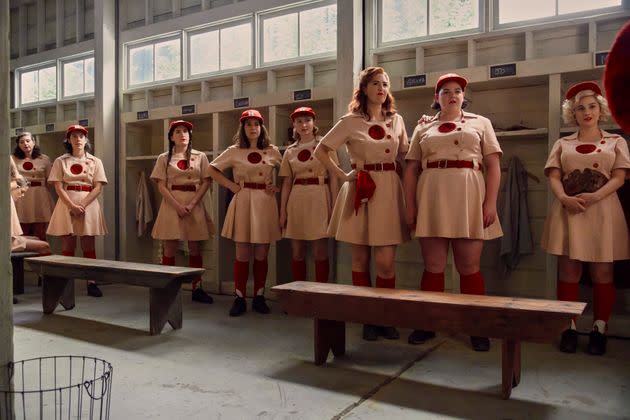The Rockford Peaches Are Back In 'A League Of Their Own' Series Reboot
- Oops!Something went wrong.Please try again later.
- Oops!Something went wrong.Please try again later.

Amazon's "A League of Their Own" debuts Aug. 12. (Photo: Anne Marie Fox/Prime Video)
Diamonds are a girl’s best friend once again in the forthcoming reboot of “A League of Their Own.”
Amazon gave viewers a first look on Tuesday at the new Rockford Peaches with a teaser for the eight-episode series, which debuts Aug. 12 and is based on the beloved 1992 film of the same name.
Abbi Jacobson of “Broad City,” who co-created the show with Will Graham, leads the cast as Carson Shaw, while Chanté Adams, D’Arcy Carden, Gbemisola Ikumelo and Roberta Colindrez are among her teammates. Actor Nick Offerman also stars as the team’s manager, Casey “Dove” Porter.
Like the movie, the new “League of Their Own” is set in 1943, the same year that the All-American Girls Professional Baseball League was created. The women’s league was formed as Major League Baseball was thrown into crisis mode during World War II, when many male athletes were drafted.
Catch the trailer for “A League of Their Own” below.
According to press notes, the series differs from its film predecessor by taking “a deeper look at race and sexuality, following the journey of a whole new ensemble of characters as they carve their own paths towards the field, both in the league and outside of it.”
By all accounts, there are some pretty big cleats to fill. Directed by Penny Marshall, the original “League of Their Own” starred Geena Davis, Tom Hanks and Madonna and is widely regarded as a classic. Rosie O’Donnell, who played one of the Rockford Peaches in the film, reportedly will make an appearance on the new series.
Appearing on “The Drew Barrymore Show” last year, Jacobson said that the series evokes “the spirit and the joy” of the movie while exploring more of “the realities of what was really going on in 1943.”
“A door opens for a lot of white women and white-passing women that get on the league that we all know from the film,” she explained. “But what about the Black women who were not allowed to try out and who had to sort of carve their own path to play baseball? It’s also a really queer story.”
This article originally appeared on HuffPost and has been updated.

